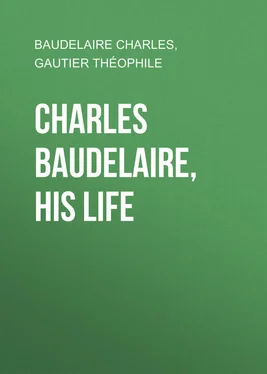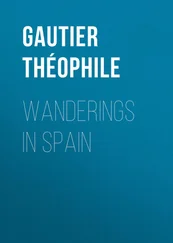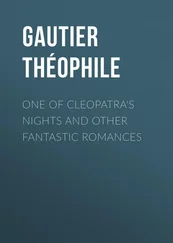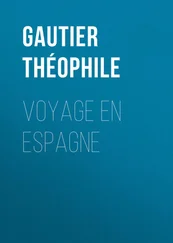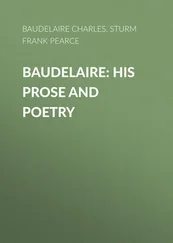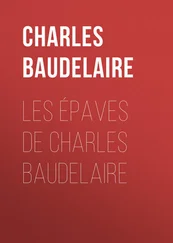Théophile Gautier - Charles Baudelaire, His Life
Здесь есть возможность читать онлайн «Théophile Gautier - Charles Baudelaire, His Life» — ознакомительный отрывок электронной книги совершенно бесплатно, а после прочтения отрывка купить полную версию. В некоторых случаях можно слушать аудио, скачать через торрент в формате fb2 и присутствует краткое содержание. Жанр: foreign_antique, foreign_prose, на английском языке. Описание произведения, (предисловие) а так же отзывы посетителей доступны на портале библиотеки ЛибКат.
- Название:Charles Baudelaire, His Life
- Автор:
- Жанр:
- Год:неизвестен
- ISBN:нет данных
- Рейтинг книги:4 / 5. Голосов: 1
-
Избранное:Добавить в избранное
- Отзывы:
-
Ваша оценка:
- 80
- 1
- 2
- 3
- 4
- 5
Charles Baudelaire, His Life: краткое содержание, описание и аннотация
Предлагаем к чтению аннотацию, описание, краткое содержание или предисловие (зависит от того, что написал сам автор книги «Charles Baudelaire, His Life»). Если вы не нашли необходимую информацию о книге — напишите в комментариях, мы постараемся отыскать её.
Charles Baudelaire, His Life — читать онлайн ознакомительный отрывок
Ниже представлен текст книги, разбитый по страницам. Система сохранения места последней прочитанной страницы, позволяет с удобством читать онлайн бесплатно книгу «Charles Baudelaire, His Life», без необходимости каждый раз заново искать на чём Вы остановились. Поставьте закладку, и сможете в любой момент перейти на страницу, на которой закончили чтение.
Интервал:
Закладка:
This last phrase is characteristic and betrays the individual taste of the poet for artificiality. He, moreover, does not hide this predilection. He takes pleasure in this kind of composite beauty, and now and then a little artificiality that elaborates advanced and unsound civilisations. Let us say, to take a concrete example, that he would prefer to a simple young girl who used no other cosmetic than water, a more mature woman employing all the resources of the accomplished coquette, in front of a dressing-table covered with bottles of essences, de lait virginal , ivory brushes, and curling-tongs. The sweet perfume of skin macerated in aromatics, like that of Esther, who was steeped in oil of palms for six months and six months in cinnamon, before presentation to King Ahasuerus, had on him a powerful effect. A light touch of rose or hortensia on a fresh cheek, beauty-spots carefully and provocatively placed at the corner of the mouth or of the eye, eye-lashes burnished with kohl, hair tinted with russet-brown and powdered with gold-dust, neck and shoulders whitened with rice-powder, lips and the tips of the fingers brightened with carmine, did not in any way revolt him.
He liked these touches of Art upon Nature, the high lights, the strong lights placed by a clever hand to augment grace, charm and the character of the face. It is not he who would write virtuous tirades against painting, rougeing, and the crinoline. All that removed a man, and especially a woman, from the natural state found favour in his eyes. These tastes explain themselves and ought to be understandable in a poet of the decadence, and the author of the "Flowers of Evil."
We shall astonish no one if we add that he preferred, to the simple perfume of the rose or violet, that of benzoin, amber, and even musk, so little appreciated in our days, and also the penetrating aroma of certain exotic flowers the perfume of which is too strong for our moderate climate. Baudelaire had, in the matter of perfumes, a strangely subtle sensuality which is rarely to be met with except amongst Orientals. He sought it always, and the phrase cited by Banville and at the commencement of this article may very justly be said of him: "Mon âme voltige sur les parfums comme l'âme des autres hommes voltige sur la musique."
He loved also toilets of a bizarre elegance, a capricious richness, striking fantasy, in which something of the comedian and courtesan was mingled, although he himself was severely conventional in dress; but this taste, excessive, singular, anti-natural, nearly always opposed to classical beauty, was for him the sign of the human will correcting, to its taste, the forms and colours furnished by matter.
Where the philosopher could only find a text for declamation he found a proof of grandeur. Depravity – that is to say, a step aside from the normal type – is impossible to the stupid. It is for the same reason that inspired poets, not having the control and direction of their works, caused him a sort of aversion, and why he wished to introduce art and technique even into originality.
So much for the metaphysical; but Baudelaire was of a subtle, complicated, reasoning, and paradoxical nature, and had more philosophy than is general amongst poets. The æsthetics of his art occupied him much; he abounded in systems which he tried to realise, and all that he did was first planned out. According to him, literature ought to be intentional , and the accidental restrained as much as possible. This, however, did not prevent him, in true poetical fashion, from profiting by the happy chances of executing those beauties which burst forth suddenly without premeditation, like the little flowers accidentally mixed with the grain chosen by the sower. Every artist is somewhat like Lope de Vega, who, at the moment of the composition of his comedies, locked up his precepts under six keys — con seis claves . In the ardour of his work, voluntarily or not, he forgot systems and paradoxes.
II
Baudelaire's reputation, which during some years had not extended beyond the limits of the little circle who rallied round the new poet, widened suddenly when he presented himself to the public holding in his hand the bouquet of the "Flowers of Evil," a bouquet which in no way resembled the innocent posy of the débutante. Some of the poems were so subtly suggestive, yet so abstruse and enveloped with the forms and veils of Art, that the authorities demanded that they should be withdrawn and replaced by others of less dangerous eccentricity, before the book could be comprised in libraries. Ordinarily, there is no great excitement about a book of verses; they are born, live, and die in silence; for two or three poets suffice for our intellectual consummation.
In the excitement, rumour, and allayed scandal which surrounded Baudelaire, it was recognised that he had given the public, which is a rare occurrence, original work of a peculiar savour. To create in the public a new sensation is the greatest joy that can happen to a writer, and especially to a poet.
"Flowers of Evil" was one of those happy titles that are more difficult to find than is generally imagined. He summed up in a brief and poetical form the general idea of the book and indicated its tendencies. Although it was evidently romantic in intention and composition, it was impossible, by even ever so frail a thread, to connect Baudelaire with any one of the great masters of that particular school. His verses, refined and subtle in structure, encasing the subjects dealt with so closely as to resemble armour rather than clothing, at first appeared difficult and obscure. This feeling was caused, not through any fault of the author, but from the novelty of the things he expressed – things that had not before been made vocal. It was part of Baudelaire's doctrine that, to attain his end, a poet must invent language and rhythm for himself. But he could not prevent surprise on the part of the reader when confronted with verse so different from any he had read before. In painting the evils which horrified him, Baudelaire knew how to find the morbidly rich tints of decomposition, the tones of mother-of-pearl which freeze stagnant waters, the roses of consumption, the pallor of chlorosis, the hateful bilious yellows, the leaden grey of pestilential fogs, the poisoned and metallic greens smelling of sulphide of arsenic, the blackness of smoke diluted by the rain on plaster walls, the bitumens baked and browned in the depths of hell; and all that gamut of intensified colours, correspondent to autumn, to the setting of the sun, to over-ripe fruit, and the last hours of civilisation.
The book is opened by a poem to the reader, whom the poet does not attempt to cajole, as is usual, and to whom he tells the absolute truth. He accuses him, in spite of all his hypocrisy, of having the vices for which he blames others, and of nourishing in his own heart that great modern monster, Ennui, who, with his bourgeois cowardice, dreams of the ferocity and debauches of the Romans, of bureaucrat Nero, and shop-keeper Heliogabalus.
One other poem, of great beauty, and entitled, undoubtedly by an ironical antiphrasis, "Benediction," depicts the coming of the poet to the world, an object of astonishment and aversion to his mother as a shameful offspring. We see him pursued by stupidity, envy, and sarcasm, a prey to the perfidious cruelty of some Delilah, happy in delivering him up to the Philistines, naked, disarmed, after having expended on him all the refinements of a ferocious coquetry. Then there is his arrival, after insults, miseries, tortures, purified in the crucible of sorrow, to eternal glory, to the crown of light destined for the heads of the martyrs who have suffered for Truth and Beauty.
One little poem which follows later, and which is entitled "Soleil," closes with a sort of tacit justification of the poet in his vagrant courses. A bright ray shines on the muddy town; the author is going out and runs through the unclean streets, the by-ways where the closed shutters hide indications of secret luxuries; all the black, damp, dirty labyrinths of old streets to the houses of the blind and leprous, where the light shines here and there on some window, on a pot of flowers, or on the head of a young girl. Is not the poet like the sun which alone enters everywhere, in the hospital as in the palace, in the hovel as in the church, always divine, letting his golden radiance fall on the carrion or on the rose?
Читать дальшеИнтервал:
Закладка:
Похожие книги на «Charles Baudelaire, His Life»
Представляем Вашему вниманию похожие книги на «Charles Baudelaire, His Life» списком для выбора. Мы отобрали схожую по названию и смыслу литературу в надежде предоставить читателям больше вариантов отыскать новые, интересные, ещё непрочитанные произведения.
Обсуждение, отзывы о книге «Charles Baudelaire, His Life» и просто собственные мнения читателей. Оставьте ваши комментарии, напишите, что Вы думаете о произведении, его смысле или главных героях. Укажите что конкретно понравилось, а что нет, и почему Вы так считаете.
